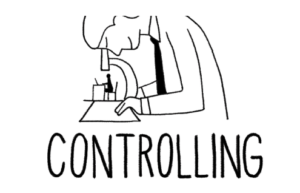 This week we continue the serialization of, How (NOT) to Be a Leader Volume 1, in preparation for the release of the next two books, How (NOT) to Build a Great Team and How (NOT) to Create a Winning Strategy. We hope you will enjoy Chapter 17 – Micromanage the Shit out of Everything.
This week we continue the serialization of, How (NOT) to Be a Leader Volume 1, in preparation for the release of the next two books, How (NOT) to Build a Great Team and How (NOT) to Create a Winning Strategy. We hope you will enjoy Chapter 17 – Micromanage the Shit out of Everything.
Sent: Sunday, August 15 at 8:50 pm
From: CEO
To: Executive Tea
Subject: Daily Reports
I continue to be dismayed by your daily reports, they are lacking in the level of detail that I specifically asked for. I want no deviation or interpretation from my written instructions. These are critical to my insight into the work you are supposed to be doing. Some of you are not using the template I asked you to, so you’ll need to redo the reports from the last couple of months. I want them to be consistent. All of them.
I look forward to seeing your revisions tomorrow.
Thanks.
One of the keys to great leadership is to get in and pull up the plants so you can examine the roots. Sure, occasionally you will cause the plant to die, but more often than not, you’ll catch root rot early.
You must always know everything that happens in your company because if you don’t, bad things will happen. You can’t really trust your people unless you know exactly what they’re doing every step of the way. Of course, this can become problematic as your organization grows, so you have to essentially clone yourself with others who are equally diligent and detailed.
To make sure that you have supreme and all-encompassing knowledge of the organi¬zation and your people, start with your leadership team. Only hire those who are absolutely loyal to you and have shown that loyalty by following your instructions to the tee: no devia¬tion, no ideas of their own, no questions. They are obedient, observant, and loyal soldiers to you first and to the organization second. Even one breach of this protocol should be cause for termination.
Once you have established that you have dutiful soldiers on your leadership team, you need to make it explicitly clear that every detail, no matter how small, is worthy of your attention. And, by extension, their attention. However, you don’t want to hear about it; you want detailed written reports. Not that you’ll read them all. The purpose is for your people to provide them, so you know they have eyes on everything. It’s about control. The more you micromanage your people, the more control you will have. And the more secure they will feel.
Now you might be saying that this will take a lot of time. And you’re right, it does. But if people aren’t reporting on everything they’re doing, how will anyone know what’s going on? Remember that people can’t really be trusted to do their jobs without supervision. They just don’t know any better. By requiring over-reporting on everything they’re doing, you keep them doing the work, reporting on the work, and learning a lot about the right way to do things! In the end, micromanaging is really for them as well.
Occasionally you’ll encounter someone who questions the reporting requirements. This person needs to go. It’s not about the report, it’s about the reporting process, so they really learn what they’re doing. Don’t defend yourself. That is unworthy of you, and the per¬son who questioned you obviously doesn’t know about good leadership.
Micromanaging is also a great way to ensure that nothing changes, that your way (the right way) is always followed. There is a great accomplishment in exactitude, and you want to make sure not only that your outcome is achieved but that the way you want it done is followed as well. You do not want change as this leads to chaos, and chaos is a challenge to your leadership.
So, go ahead, pull up the plants to inspect the roots all you want. It works. Teach your team to do the same, and before long, you’ll have a well-oiled machine that is doing ex¬actly the same thing all the time. Success will be yours. Employees really love this too as it teaches them discipline and obedience, exactly what they need to be successful under your leadership.
Let’s Get Real
Micromanaging anything or anyone is a recipe for failure. Almost everyone has been at the mercy of the kind of manager who is so insecure that they need to inspect and direct your every move. The result is always the same: a completely disempowered workforce that is dying on the vine and eventually leaves because a low tech robot could do their job.
When first working with a manager, you’ll need to pay more attention than you will after they start learning the work. Intervene early and often, then let them go. Innovation and ideas come from them figuring out problems on their own. Micromanagement stifles innovation every single time. You should keep your attention on the results, not how they got there.
Endless, pointless reports? Get rid of them. Focus on the results and forget about the process as long as it’s working. No one likes documenting things that are already easily discernible. And everyone realizes this is a form of control, so use reports that actually tell you something and ditch the rest.
